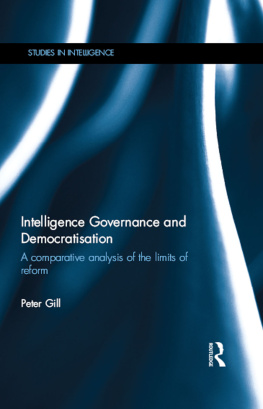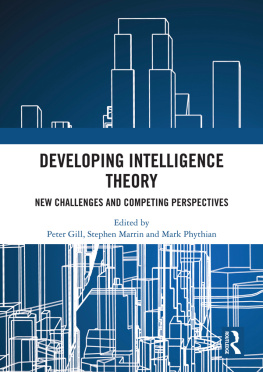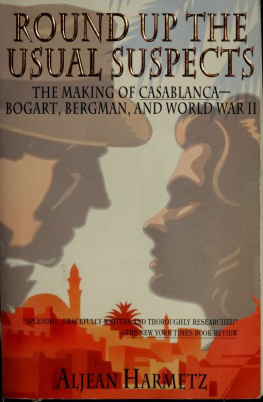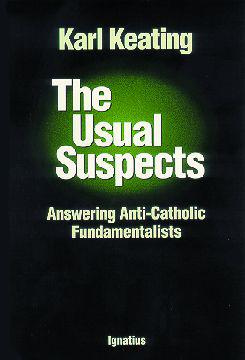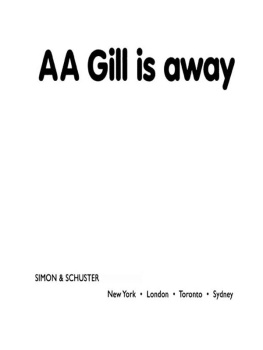ROUNDING UP THE USUAL SUSPECTS?
For Nicola, Joanna, Ellen and Robert
Captain Louis Renault (Claude Rains):
'Major Strasser has been shot. Round up the usual suspects.'
Casablanca (Dir. Michael Curtiz, Warner, 1942)
Rounding Up the Usual Suspects?
Developments in contemporary law enforcement intelligence
Peter Gill
Liverpool John Moores University
First published 2000 by Ashgate Publishing
Reissued 2018 by Routledge
2 Park Square, Milton Park, Abingdon, Oxon OX14 4RN
711 Third Avenue, New York, NY 10017, USA
Routledge is an imprint of the Taylor & Francis Group, an informa business
Copyright Peter Gill 2000
All rights reserved. No part of this book may be reprinted or reproduced or utilised in any form or by any electronic, mechanical, or other means, now known or hereafter invented, including photocopying and recording, or in any information storage or retrieval system, without permission in writing from the publishers.
Notice:
Product or corporate names may be trademarks or registered trademarks, and are used only for identification and explanation without intent to infringe.
Publisher's Note
The publisher has gone to great lengths to ensure the quality of this reprint but points out that some imperfections in the original copies may be apparent.
Disclaimer
The publisher has made every effort to trace copyright holders and welcomes correspondence from those they have been unable to contact.
A Library of Congress record exists under LC control number: 00134475
ISBN 13: 978-1-138-73627-6 (hbk)
ISBN 13: 978-1-315-18601-6 (ebk)
Asked by a colleague some years ago what I was working on, I replied, 'A book about police intelligence'. He laughed heartily: 'But, surely, that's an oxymoron like military music'. A lively discussion ensued both as to whether policing could be 'intelligent' and, if so, was this not likely to be repressive? I hope that the book provides at least partial answers to these and other questions that emerge can policing, more often associated with 'doing' than with 'thinking', re-invent itself in the Information Age? By appropriating new technological tools, is policing changing or is it merely using them in its historical mission of controlling the 'dangerous classes'?
Since 1993 police in the UK have been developing the idea of 'intelligence-led policing' and seeking to shift organisational practices in order to attain their goals more effectively. Charting and explaining the progress, or otherwise, of this shift is the central aim of this study. While concerned mainly with developments in the UK, it seeks to compare these with police intelligence structures in North America, specifically, Canada and New York State. The value of comparative analysis is that it provides a broader context for evaluating police practices than the study of any single country can do. The developments described here are on-going, for example, the UK Government has just introduced to Parliament a Regulation of Investigatory Practices Bill I have not tried to deal systematically with events after February 2000.
Many of the people I have talked to and interviewed during the research and writing of this book would prefer not to be named but I would like to thank them all for their help. My thanks to the Canadian High Commission in London and John Moores University who awarded me research grants that enabled the research to be carried out in, respectively, Canada and New York. Thanks to Pete Ackerley for encouraging the project and arranging access to North Wales Police. I am grateful to Alana Barton and Roger Evans for giving me access to the unpublished data from their study of Merseyside Police. Several people have read parts of the book Alana Barton, Blair Southerden and Steve Tombs, and gave me useful comments. Geoff Ponton kindly read and provided valuable editorial suggestions on the whole thing. Reg Whitaker has provided much assistance through his regular circulation to myself and other colleagues of the results of his trawlings on the Net. The meetings with colleagues in the ESRC Seminar Series on 'Policy Responses to Transnational Organised Crime' have been constantly stimulating, in particular, I am grateful to Adam Edwards and Peter Klerks for their suggestions. Thanks to colleagues in the Centre for Criminal Justice at Liverpool John Moores University for the congenial environment they provide and some more specific feedback on a paper I delivered to a research seminar. Thanks to i2 for giving me permission to reproduce the Figures that appear in chapter nine. As ever, none of these named or unnamed helpers are responsible for any errors or the particular interpretations that appear.
Finally, most thanks to Pen, Ell and Rob who have all been very supportive throughout this project.
Pete Gill, May 2000
- ACC Assistant Chief Constable (UK)
- ACIIS Automated Criminal Intelligence Information System (Canada)
- ACPO Association of Chief Police Officers (UK)
- ADA assistant district attorney (US)
- BATF Bureau of Alcohol, Tobacco and Firearms (US)
- BCU Basic Command Unit
- BOSS Bureau of Special Services (New York)
- CACP Canadian Association of Chiefs of Police
- CLEU Co-ordinated Law Enforcement Unit (Canada)
- CIA Central Intelligence Agency (US)
- CID Criminal Investigation Department (UK)
- CISC Criminal Intelligence Service Canada
- CISO Criminal Intelligence Service Ontario (Canada)
- CIU criminal intelligence unit
- CPA crime pattern analysis
- CPIA Criminal Procedure and Investigations Act 1996 (UK)
- CPS Crown Prosecution Service (UK)
- CSIS Canadian Security Intelligence Service
- DA district attorney (US)
- DC Detective Constable (UK)
- DCI Detective Chief Inspector (UK)
- DI Detective Inspector (UK)
- DOI Department of Investigation (New York)
- DS Detective Sergeant (UK)
- DEA Drug Enforcement Administration (US)
- FBI Federal Bureau of Investigation (US)
- ECHR European Convention on (or, Court of) Human Rights
- EEA European Economic Area
- EU European Union
- FinCEN Financial Crimes Enforcement Network (US)
- FIO Field Intelligence Officer (UK)
- FIB Force Intelligence Bureau (UK)
- FRU Field Reconnaissance (sometimes Research) Unit (Northern Ireland)
- GCHQ Government Communications Headquarters (UK)
- GIS Geographical Information Systems
- GRID General Reference Information Database (UK Customs)
- HIDTA High Intensity Drug Trafficking Area (US)
- HMIC Her Majesty's Inspectors of Constabulary (UK)
- HOLMES Home Office Large Major Enquiry System (UK)
- IALEIA International Association of Law Enforcement Intelligence Analysts
- ICT Information and Communication Technologies
- ICU Intelligence Co-ordination Unit (UK Customs)
- IOCA Interception of Communications Act 1985 (UK)
- ILA International Longshoremen's Association (US)
- ILETS International Law Enforcement Telecommunications Seminar
- ILP intelligence-led policing
- INS Immigration and Naturalization Service (US)


